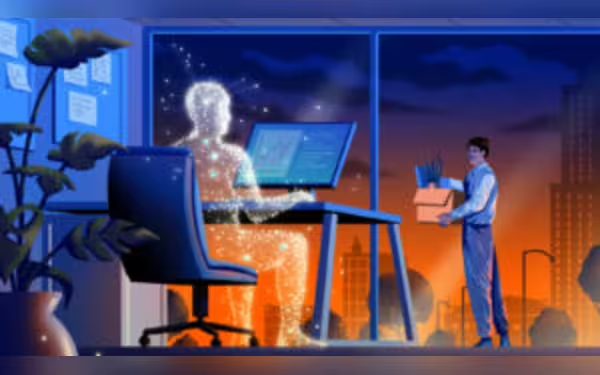Thursday, July 4, 2024 07:20 PM
AI and Automation: Transforming Workforce Dynamics
- AI and automation reshaping industries by enhancing human capabilities
- Future jobs to require blend of technical and soft skills
- New job opportunities emerging in AI development and maintenance
 Image Credits: phoneworld_pk
Image Credits: phoneworld_pkThe fusion of AI and automation is revolutionizing industries, creating new job opportunities, and emphasizing the importance of adaptability and continuous learning in the evolving workforce landscape.
In today's rapidly evolving world, the fusion of artificial intelligence (AI) and automation is reshaping how we work. This integration is paving the way for a future where robots handle routine tasks, freeing up humans to focus on more stimulating and intricate work.
AI is set to transform various industries by acting as a valuable assistant to professionals such as doctors and lawyers. For example, AI can help doctors diagnose illnesses quickly and accurately, and aid lawyers in conducting thorough case research efficiently.
Despite common fears, the advancement of AI and automation does not signify the end of jobs. Instead, it signals a shift towards roles that demand problem-solving and creativity. To succeed in this changing landscape, individuals must remain adaptable and committed to continuous learning.
Sectors like manufacturing, logistics, and customer service are already experiencing the impact of robots and AI. Tasks once reserved for human intelligence, like data analysis and content creation, are now being automated with AI's assistance.
Automation is revolutionizing various industries, with industrial robots boosting production efficiency, self-driving vehicles transforming transportation, and AI-powered chatbots streamlining customer service. Additionally, AI is automating administrative tasks like data entry and scheduling, enabling human workers to focus on strategic initiatives.
While some jobs may face automation, most are likely to evolve into hybrid roles that blend human creativity with machine efficiency. Professionals in diverse fields can harness AI to enhance their work, whether supporting doctors in treatment planning, aiding lawyers in legal research, or empowering marketers with targeted advertising.
The future job market will require a workforce with a broad skill set, encompassing technical abilities like data analysis and coding, along with soft skills such as critical thinking and communication. Adaptability and a commitment to lifelong learning will be essential for individuals to thrive in this AI-driven era.
As AI continues to shape industries, new job opportunities will emerge, focusing on the development, deployment, and maintenance of AI systems. Roles like robotics engineers, data scientists, and AI ethicists will be in high demand, underscoring the increasing importance of ethical considerations in AI development.
Moreover, ensuring data quality and building trust in AI systems will create roles in data curation, AI training, and explaining AI decisions to humans. Experts who can facilitate effective collaboration between human and machine intelligence will play a crucial role in maximizing the benefits of AI integration.
Looking ahead, advancements in AI could lead to the establishment of entirely new industries, broadening the scope of job opportunities and diversifying the employment landscape.
The integration of AI and automation is reshaping the job market, offering new possibilities and challenges. Embracing this change, staying adaptable, and fostering a culture of continuous learning will be key to thriving in the evolving world of work.













